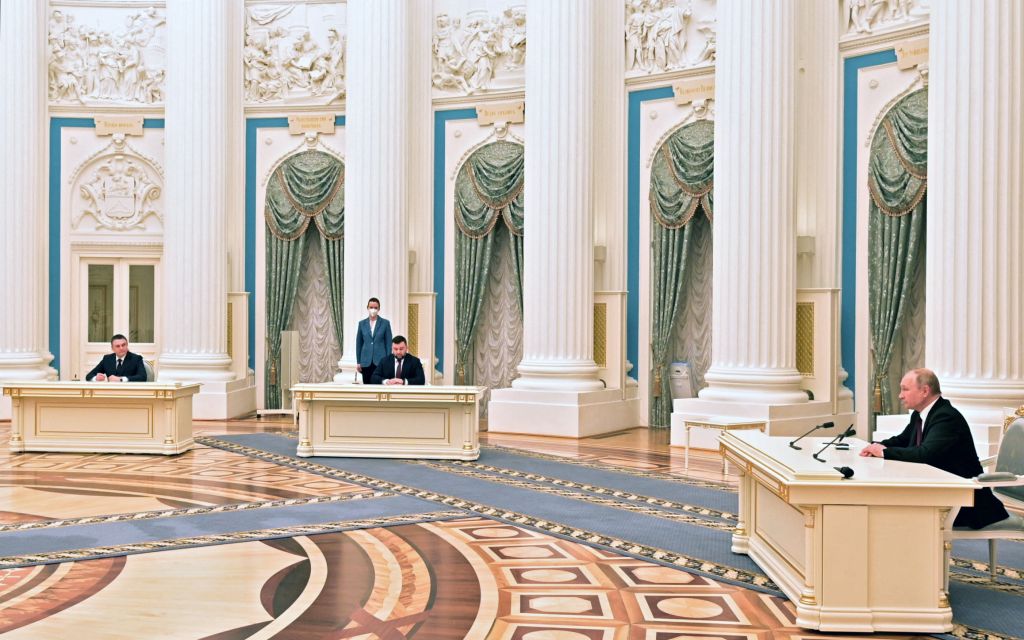
The world is not enduring a ‘Ukraine crisis’, but rather a Russia crisis. So
said Germany’s new foreign minister, Annalena Baerbock, at the most recent Munich Security Conference, which was dominated by the situation in eastern Europe.
In fact, Russia’s crisis goes even deeper than Baerbock probably meant. We are witnessing the latest instalment in a longer process. Russia is trying to decide whether it is a nation-state or an aspiring empire, and until that fundamental question is resolved, conflicts like the one over Ukraine will continue in various forms.
On paper, the Soviet Union was a multinational federation of republics. In reality, Russians were solidly in command of a tightly controlled regime headed by the Communist Party. One reason for the Soviet collapse was that many of its constituent republics had become aspiring nation-states, or, as with the Baltic republics, sought to recover their independence. The single most important factor was Ukraine’s December 1991 referendum, in which an overwhelming majority voted for independence. But Russian President Boris Yeltsin’s behind-the-scenes efforts to assert Russia’s own sovereignty were also important.
At the time, Soviet President Mikhail Gorbachev was still struggling to preserve certain state structures, and he responded with hostility to the three Baltic republics’ expressed aspirations. But he was undercut by Yeltsin, who had recognised the independence of Estonia, Latvia and Lithuania even before the Ukrainian referendum.
That was the start of today’s Russia crisis, fuelled by the conflict between building a modern state and economy, on the one hand, and indulging imperial nostalgia, on the other. As a result, Russia’s economic and political modernisation has been hampered, and its neighbours’ security has been in doubt.
The best way for Russia to guarantee its own security would be to foster friendly relations with its neighbours, so that they can feel secure and stable themselves. But it has not done that, and now a growing number of Ukrainians want to join NATO. Unrealistic as that seems, they recognise that their own national aspirations are directly threatened by Russian imperial revanchism.
In an infamous
essay published last July, Russian President Vladimir Putin
articulated his vision of a great Slavic empire, harking back to 19-century tsarist rule, rather than to the Soviet Union. Sensing an opportunity to promote that vision, he engineered the current crisis.
But Putin’s machinations are nothing new. In 2014, he annexed Crimea and launched an incursion into eastern Ukraine’s Donbas region because he wanted to prevent Ukraine from seeking closer ties with the European Union. Even though that would not have impaired Ukrainian cooperation with Russia or threatened Russian security, such developments ran counter to Putin’s quasi-imperialist dream.
Putin took his fantasy to a new extreme in his recent speech
announcing that Russia would recognise the independence of the two breakaway Donbas regions that it has backed since 2014. Putin openly questioned the existence of a Ukrainian nation and insisted that Ukraine is a ‘historically Russian land’. Although there was a Kyivan Rus state long before any Russia had appeared, Putin attributes the emergence of a Ukrainian state to Lenin and the Bolsheviks.
The irony of this history-driven strategy is that if one were to survey the Europe of a thousand years ago, there would be no Russia to speak of. Rudimentary Slavic state structures had begun to emerge in the region stretching from Novgorod to Kyiv, along the old trading routes between the Baltic and Black Seas. But Constantinople was the imperial metropole. What we now call Russia wouldn’t take form until centuries later, following a gradual military expansion in different directions.
To ground imperial ambitions in old national myths is as dangerous in Russia’s case as it is everywhere else. Europe can enjoy peace only if all the borders and boundaries that history has produced (usually through bloodshed) are fully respected. Russia ought to have learned to live harmoniously with its neighbours by now. Following the Sino-Soviet split, the Soviet Union had vast military forces stationed along its border with China, and violent conflict erupted for seven months in 1969. But the two countries de-escalated, and now both are better off for it.
To be sure, the road to establishing the same kind of relationship between Russia and Ukraine is much longer. Putin’s behaviour has understandably left Ukrainians sceptical of Russia, if not hostile towards it. Unless Russia refocuses on building its future solely within its own borders, the region will remain under a cloud of insecurity, ultimately to Russia’s detriment.
I still remember a conversation I had decades ago with former German Chancellor Helmut Kohl, a statesman well versed in European history. Discussing Luxembourg, he noted that Germany was secure because even its smallest neighbour saw it as a close friend. Germany has come to terms with its past. Russia has not. Until it does, all of Europe, but especially Russia itself, will continue to suffer.
 Print This Post
Print This Post